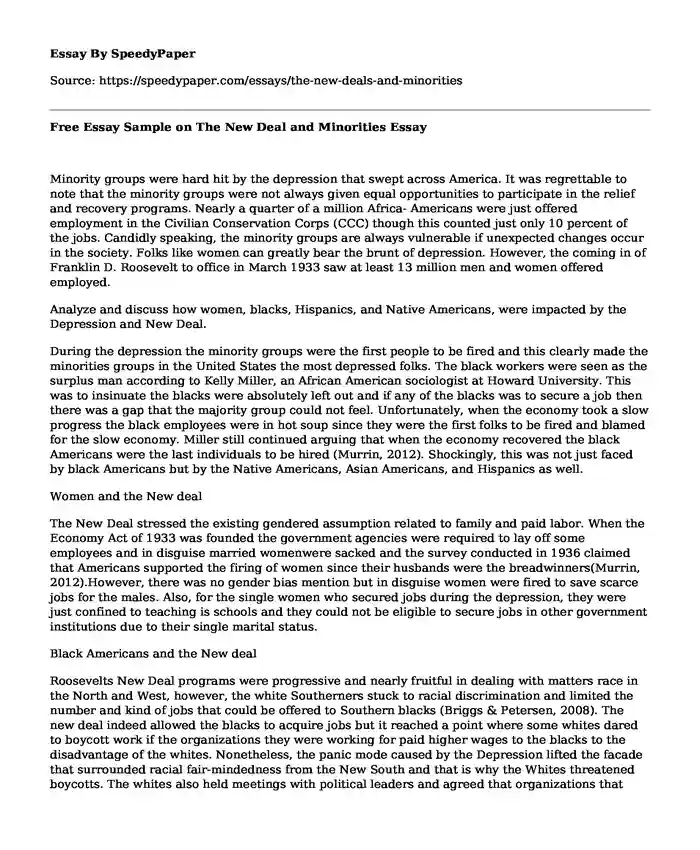
| Type of paper: | Essay |
| Categories: | History Discrimination United States The Great Depression |
| Pages: | 3 |
| Wordcount: | 779 words |
Minority groups were hard hit by the depression that swept across America. It was regrettable to note that the minority groups were not always given equal opportunities to participate in the relief and recovery programs. Nearly a quarter of a million Africa- Americans were just offered employment in the Civilian Conservation Corps (CCC) though this counted just only 10 percent of the jobs. Candidly speaking, the minority groups are always vulnerable if unexpected changes occur in the society. Folks like women can greatly bear the brunt of depression. However, the coming in of Franklin D. Roosevelt to office in March 1933 saw at least 13 million men and women offered employed.
Analyze and discuss how women, blacks, Hispanics, and Native Americans, were impacted by the Depression and New Deal.
During the depression the minority groups were the first people to be fired and this clearly made the minorities groups in the United States the most depressed folks. The black workers were seen as the surplus man according to Kelly Miller, an African American sociologist at Howard University. This was to insinuate the blacks were absolutely left out and if any of the blacks was to secure a job then there was a gap that the majority group could not feel. Unfortunately, when the economy took a slow progress the black employees were in hot soup since they were the first folks to be fired and blamed for the slow economy. Miller still continued arguing that when the economy recovered the black Americans were the last individuals to be hired (Murrin, 2012). Shockingly, this was not just faced by black Americans but by the Native Americans, Asian Americans, and Hispanics as well.
Women and the New deal
The New Deal stressed the existing gendered assumption related to family and paid labor. When the Economy Act of 1933 was founded the government agencies were required to lay off some employees and in disguise married womenwere sacked and the survey conducted in 1936 claimed that Americans supported the firing of women since their husbands were the breadwinners(Murrin, 2012).However, there was no gender bias mention but in disguise women were fired to save scarce jobs for the males. Also, for the single women who secured jobs during the depression, they were just confined to teaching is schools and they could not be eligible to secure jobs in other government institutions due to their single marital status.
Black Americans and the New deal
Roosevelts New Deal programs were progressive and nearly fruitful in dealing with matters race in the North and West, however, the white Southerners stuck to racial discrimination and limited the number and kind of jobs that could be offered to Southern blacks (Briggs & Petersen, 2008). The new deal indeed allowed the blacks to acquire jobs but it reached a point where some whites dared to boycott work if the organizations they were working for paid higher wages to the blacks to the disadvantage of the whites. Nonetheless, the panic mode caused by the Depression lifted the facade that surrounded racial fair-mindedness from the New South and that is why the Whites threatened boycotts. The whites also held meetings with political leaders and agreed that organizations that were doing the employee layoff should fire a white after non-whites had been shown the exit at their workplaces. This made the jobs of the blacks at risk and their minority status troubled them in most organizations that had offered them jobs.
Impact on Native Americans
The great depression worsened the living conditions of the Native Americans. Their living conditions were absolutely unbearable. The natives were not spared during the employee layoff. The organizations were forced to lay off the Native Americans as well when the economy was at unprecedented slow progress (Briggs & Petersen, 2008). Also, the unbearable conditions for the natives forced the federal government to support the increase of funds available to the Bureau of Indian Affairs so as to help them remedy the Natives terrible living conditions.
Impact on the Hispanics
During the great deal, Hispanics were never spared. They were forced to migrate to other places to raise their standards of living which had deteriorated to unbearable levels. They migrated to Mexico to seek a haven there. They also, suffered in the job market when the employee layoff struck the US.
In conclusion, the Great depression and New deal affected all the settlers in the United States. However, the minority groups suffered the worst.
References
Briggs, B.-A., & Petersen, C. F. (2008). Brief review United States history and government. Boston: Pearson/Prentice Hall.
Murrin, J. M. (2012). Liberty, equality, power: A history of the American people. Australia: Wadsworth/Cengage Learning.
Di, N. M. R. (2014). The Great Depression and New Deal: Documents decoded.
Cite this page
Free Essay Sample on The New Deal and Minorities. (2019, Jun 19). Retrieved from https://speedypaper.com/essays/the-new-deals-and-minorities
Request Removal
If you are the original author of this essay and no longer wish to have it published on the SpeedyPaper website, please click below to request its removal:
- Essay Example on How Social Media Affects Teenagers
- Essay Sample Dedicated to the Quality Initiatives in US Healthcare
- Research Proposal Paper Sample on the Effectiveness of Using Mosquito Nets to Prevent the Menace of Malaria
- Free Essay: Why Drugs Shouldn't Be Legal
- Essay Sample on Mentorship: A Key to Organizational Success & Competitive Advantage
- Essay on Transformative Learnings in Sociology: A Deeper Understanding of Discrimination and Feminist Theory
- Free Paper Sample on History of Western Civilization II
Popular categories




